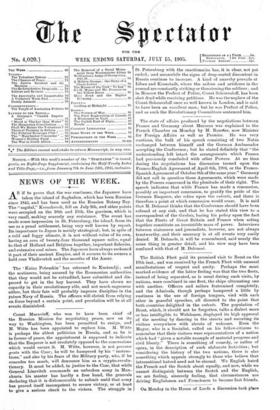The British Fleet paid its promised visit to Brest on
the 10th inst., and was received by the French Fleet with unusual manifestations of respect and amity. Perhaps the most marked evidence of the latter feeling was that the two fleets, instead of being separated, as is usual during such visits, by nations, were combined in one fleet, the ships alternating one with another. Officers and sailors fraternised completely, and the Admirals, though perhaps hampered a little by rustiness in the use of foreign tongues, vied with each other in graceful speeches, all directed to the point that both countries delighted in the entente. The population of Brest, which, it should not be forgotten, talks a dialect more or less intelligible to Welshmen. displayed its high approval of the meeting by dancing in the streets and escorting its visitors everywhere with shouts of welcome. Even the Mayor, who is a Socialist, called on his fellow-citizens to remember that their visitors were representatives of a nation which had "given a notable example of material progress and civil liberty." There is something of comedy, or rather of opera, in the description of such elaborate festivities ; but considering the history of the two nations, there is also something which appeals strongly to those who believe that international hatred need not be eternal. We English bated the French and the Scotch about equally, and now, while we cannot distinguish. between the Scotch and the English, we are feeling, sincerely feeling, that circumstances are driving Englishmen and Frenchmen to become fast friends.
On Monday in the House of Lords a discussion took place






































